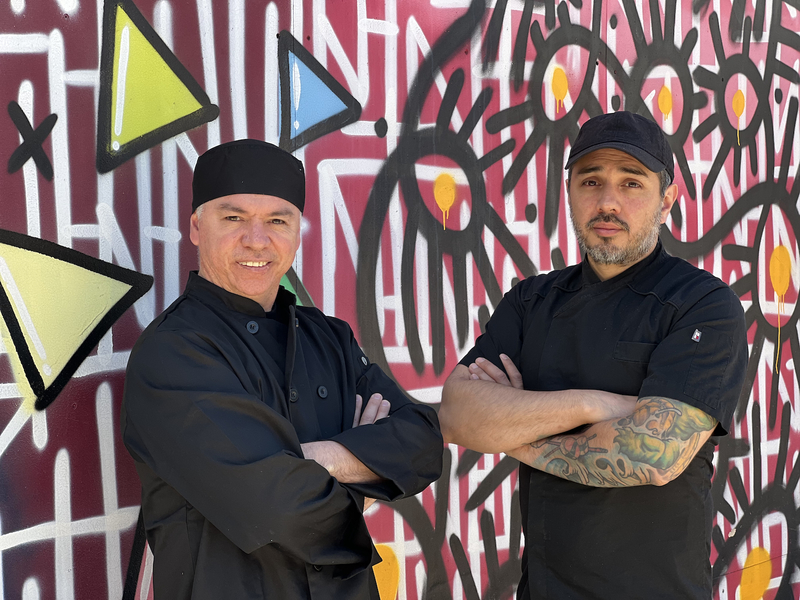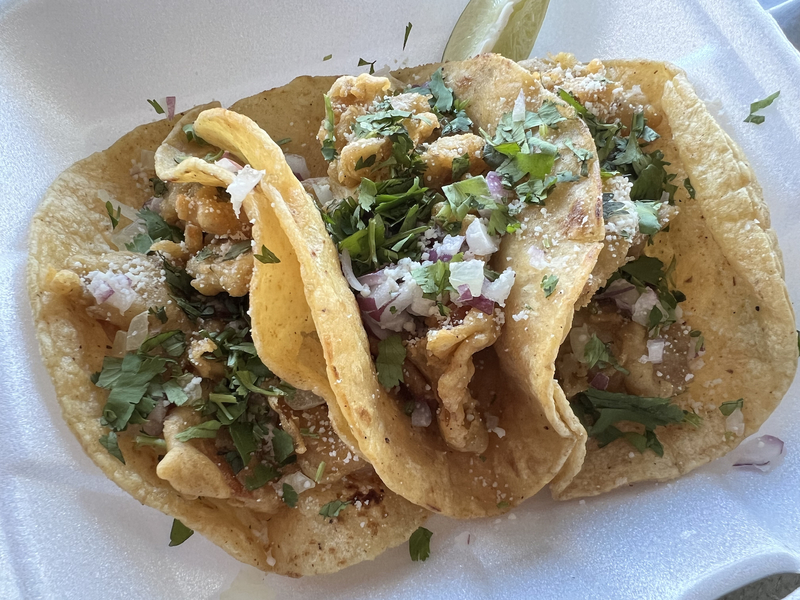It was June 26, 2014 and it was Food Truck Friday at Red Arrow Park. As the trucks gathered, a brand new mobile eatery made its inaugural appearance, rolling through with a small menu of pinoy, rice and pancit.
The truck was operated by two young sibling entrepreneurs: Alexa Alfaro and Matthew Alfaro, both of whom – with support from their parents (Deb and Ray) – left their college careers behind to pursue an entrepreneurial food truck dream. [Listen as they tell their story in this episode of FoodCrush.]
“In 2014,” Alexa Alfaro says, “Creating Meat on the Street was about bringing people something new. We knew the cuisine was relatively unfamiliar to people and we didn’t want to over-complicate things. We wanted to have fun and share all of this delicious food with other people.”
As a result, she says, they gave the truck a very American “food truck appropriate” name: Meat on the Street.
Evolution
By 2016, Meat on the Street established a brick and mortar presence in Eleven25 at the Pabst, 1125 N. 9th St., allowing them to expand their menu to include items like lechon kawali, egg rolls, lumpia, ube ice cream and halo halo, giving guests a larger sampling of the breadth of Filipino cuisine.
“In the Philippines, food is love,” says Alexa Alfaro, who has taken over day to day operations for the brand. “And we always wanted to communicate that. We wanted to make Filipino food palatable and approachable. But our goal wasn’t about sharing our culture beyond the scope of food.”
Over time, things evolved.
“In the past few years, people were asking more from us,” she says. “They were open to trying every new menu item we introduced. They wanted to know more about us, about the Philippines. And the more we shared, the more people wanted to know.”
By the end of 2019, she says, they knew that the Meat on the Street name no longer made sense for the business. “We needed a name that expressed more about who we are, that tells our story,” she says.
An homage to magulang
“As I considered the business and where I wanted it to go, I wanted to find a name that every Filipino could relate to,” says Alfaro. “It had to be a name that they could be proud of. Ultimately, it came down to family.”
She settled on the name Tatay’s Truck (pronounced /tah TIES/ Truck), a name derived from the Filipino word for “father.”
“The name is an homage to my parents,” says Alfaro. “They were my initial investors, staff and PR team. They raised us to dream big and work hard for what we wanted.”But, as the name Tatay indicates, it’s also a very special homage to Alfaro’s father Ray, an electrical engineer who was among the first in his family to move to the U.S. from the Philippines.
“His family came here in the late 1970s,” says Alfaro. “And they moved to Alaska, which is where he met my mom. She is from Oak Creek, Wisconsin and was completing her degree at the University of Alaska Anchorage. They got married, had me and then moved back to Oak Creek. From there, my father went back to school and earned his engineering degree.”
Alfaro says her father was a window to her cultural heritage.
“Growing up, we learned most of what we know of our Filipino culture from my dad. He loved to cook, and we’d always spend time together while he made different Filipino dishes. It’s how we learned about him, about our cultural heritage. He told us all of these stories about growing up in the Philippines, and we got to know more about him – and our culture – through those stories.”
“It’s so remarkable to me, even now,” she adds. “To look back and realize that – against all odds – he came here, after living in poverty in the Philippines, and built this life for his family, for us his kids.”
A truck that looks the part
Once she’d chosen the name, Alfaro moved on to pursue other elements of the rebrand, including a new logo and (in accordance) a new look and feel for Tatay’s Truck.
Thanks to a long-term relationship with Milwaukee Downtown, Alfaro says she was able to pitch the idea of a sponsorship for the rebrand, which included a public call for an artist who could design a new look for the food truck and covering the cost for rewrapping the truck.
With their assistance, Meat on the Street was able to commission local artist Emma Daisy Gertel – the accomplished visual artist behind numerous projects including the Bayshore Art Project, the gorgeous murals at Merge, and some of the eye-catching art in Black Cat Alley – transform the food truck, incorporating visual elements central to the Philippines and Filipino culture.
"There's nothing more synonymous with summer in the city than the return of food trucks downtown," says Beth Weirick, CEO of Milwaukee Downtown, BID #21. "As a critical part of downtown's vibrancy, we're proud to partner with the Meat on the Street team for this one-of-a-kind mobile mural and rebranding as Tatay's Truck, where street eats and street art intersect to celebrate our community's AAPI heritage."
Tatay’s Truck will make its official debut today (May 27) at 11 a.m. at the Chase Tower, located at Water Street and Wisconsin Avenue. The unveiling will cap off Asian American Pacific Islander (AAPI) Heritage Month with a unique intersection of street eats and street art. Food from the truck will also be available for purchase at the event between 11 a.m. and 1 p.m.
Here's a sneak peek:
Tatay’s Truck marks the first phase of a full-scale rebrand for the former Meat on the Street, which will eventually extend to the brick and mortar aspect of the business.
“We’re taking this one step at a time,” she says. “For now, it’s about the food truck, acknowledging our origins and paying homage to our Filipino heritage.”
You can follow Tatay's Truck on Facebook, Instagram and Twitter. For more information, including the food truck's menu, schedule and catering, visit tataystruck.com.
You can also visit Meat on the Street at their brick and mortar location at the Eleven25 at the Pabst, 1125 N. 9th St.
As a passionate champion of the local dining scene, Lori has reimagined the restaurant critic's role into that of a trusted dining concierge, guiding food lovers to delightful culinary discoveries and memorable experiences.
Lori is an avid cook whose accrual of condiments and spices is rivaled only by her cookbook collection. Her passion for the culinary industry was birthed while balancing A&W root beer mugs as a teenage carhop, fed by insatiable curiosity and fueled by the people whose stories entwine with every dish. Lori is the author of two books: the "Wisconsin Field to Fork" cookbook and "Milwaukee Food". Her work has garnered journalism awards from entities including the Milwaukee Press Club. In 2024, Lori was honored with a "Top 20 Women in Hospitality to Watch" award by the Wisconsin Restaurant Association.
When she’s not eating, photographing food, writing or planning for TV and radio spots, you’ll find Lori seeking out adventures with her husband Paul, traveling, cooking, reading, learning, snuggling with her cats and looking for ways to make a difference.







